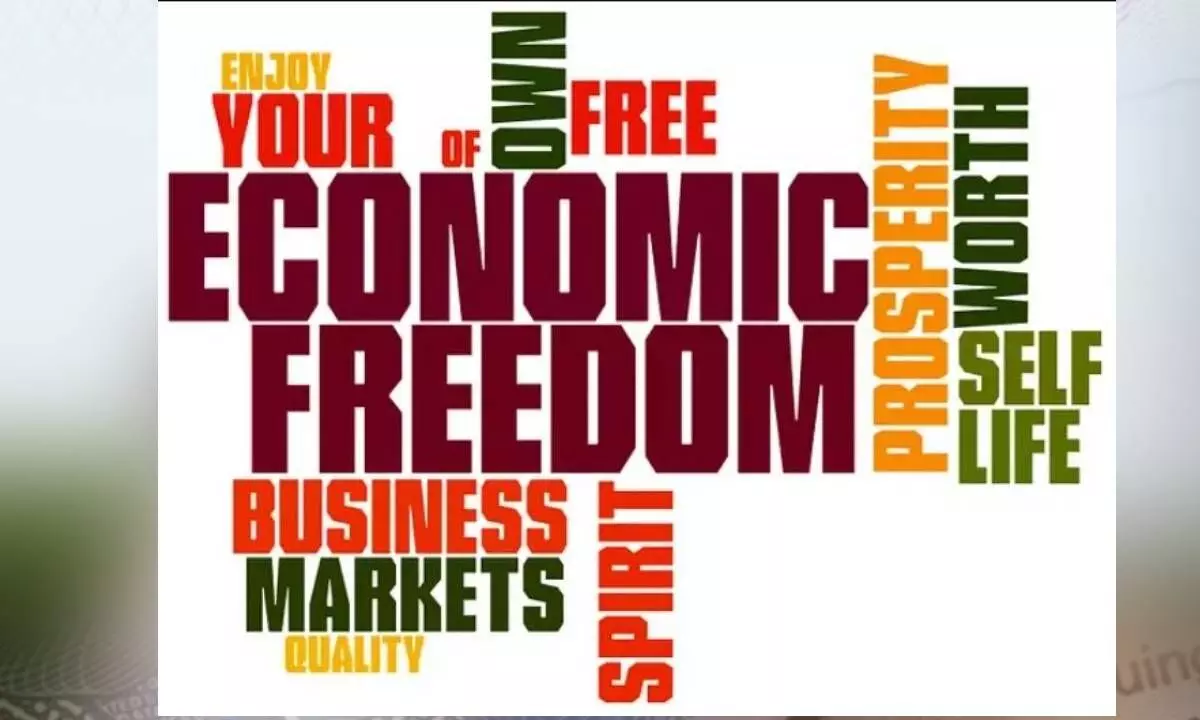Most nations have to rework on laying the road to economic freedom now
Ranked 154 across parameters, China is categorised as a repressed economy
image for illustrative purpose

Economic freedom is the fundamental right of every human being, who is entitled to control his or her own labour and property. In an economically free society, individuals are free to work, produce, consume and invest as and how pleases them.
The concept of economic freedom serves as a vital framework for evaluating the extent to which individuals and businesses have the freedom to take economic decisions. In countries with low economic freedom, governments coerce and restrain, thereby denying individuals and businesses of their choices, which could eventually hinder prosperity.
The ranking categorizing scores of 80+ as free economies, 70-79.9 as mostly free, 60-69.9 as moderately free, 50-59.9 as mostly less free and 0-49.9 as repressed. This ranking uses four broad categories with three key indicators each, both qualitative and quantitative, to measure economic freedom.
Rule of law: Property rights, judicial effectiveness and government integrity
Size of government: Tax burdens, fiscal health and government spending
Regulatory efficiency: Labour freedom, monetary freedom and business freedom
Open markets: Financial freedom, trade freedom and investment freedom
The 12 indicators are weighted equally and scored from 0-100. The overall score is then determined from the average of the 12 indicators.
Only four countries have a score of 80 or above-Ireland, Singapore, Switzerland and Taiwan, categorizing them as completely free economically.
From a regional perspective, Europe ranks the strongest in economic freedom. Despite it being a powerhouse, Germany, with a score of 73.7, ranks 10th in the continent. One of the categories Germany scored the weakest in was government spending (28.3/100). Over the last three years, government spending has averaged 49% of GDP.
Ireland ranks third globally, scoring particularly high in categories like property rights and judicial effectiveness. It also has no minimum capital requirement—which is typically a banking regulation and corporate law issue determining how many assets an organization must hold—making it attractive for businesses to set up shop in the Emerald Isle.
In the Americas, the United States ranks third regionally, and 25th overall, with a score of 70.6. The report classifies the U.S. as “mostly free” to issues like inflation, increasing government debt, and unchecked deficit spending. Public debt currently sits at a figure equivalent to more than 128% of GDP.
China’s score is among the lowest in East Asia and Oceania, ranking 154th in the world and being thereby categorized as a repressed economy. The ruling Chinese Communist Party routinely exercises direct control over economic activity. China’s protectionist stance towards foreign investment and a plethora of trade tariffs imposed by other nations also factor in here.
In India, where public debt is equivalent to about 84% of GDP, fiscal health is the worst-scoring category. Additionally, much of the economy remains quite informal; a large share of people work in jobs without tax slips, recorded income or formal contracts protecting them, which challenges labour freedoms.
It may come as no surprise that the United Arab Emirates (UAE) has the highest score in the Middle East. It has implemented various measures and initiatives, such as tax exemptions, duty-free zones, streamlined business registration processes, and flexible regulatory frameworks to encourage entrepreneurship and FDI. As well, the top individual and corporate tax rates in the country are 0%.
Currently, Africa is the continent with the least economic freedom in the world. However, it is also the region with the highest potential for economic growth. A booming population, and labour force, promise future innovation. In fact, it’s anticipated that Africa will see an increase of 2.5 billion people by the end of the century.
The lowest scoring country in Africa is Sudan, a country under further strain because of civil conflict. Historically, economic development has been constrained by rampant corruption and a lack of institutional capacity.
Conversely, Botswana registered the highest score in the continent (64.9), ranking higher than France and Italy.
High rankings correlate strongly with higher average income per person, higher income of the poorest 10%, higher life expectancy, higher literacy, lower infant mortality, higher access to water sources and less corruption.
People living in the top one-fifth of countries enjoyed an average income of $23,450 and an growth rate in the 1990s of 2.56 percent; in contrast, the bottom one-fifth in the rankings had an average income of just $2,556 and a -0.85 percent growth rate in the 1990s. The poorest 10 percent of the population have an average income of just $728 in the lowest ranked countries compared with over $7,000 in the highest ranked countries.
The life expectancy of people living in the highest ranked nations is 20 years longer than for people in the lowest ranked countries.

